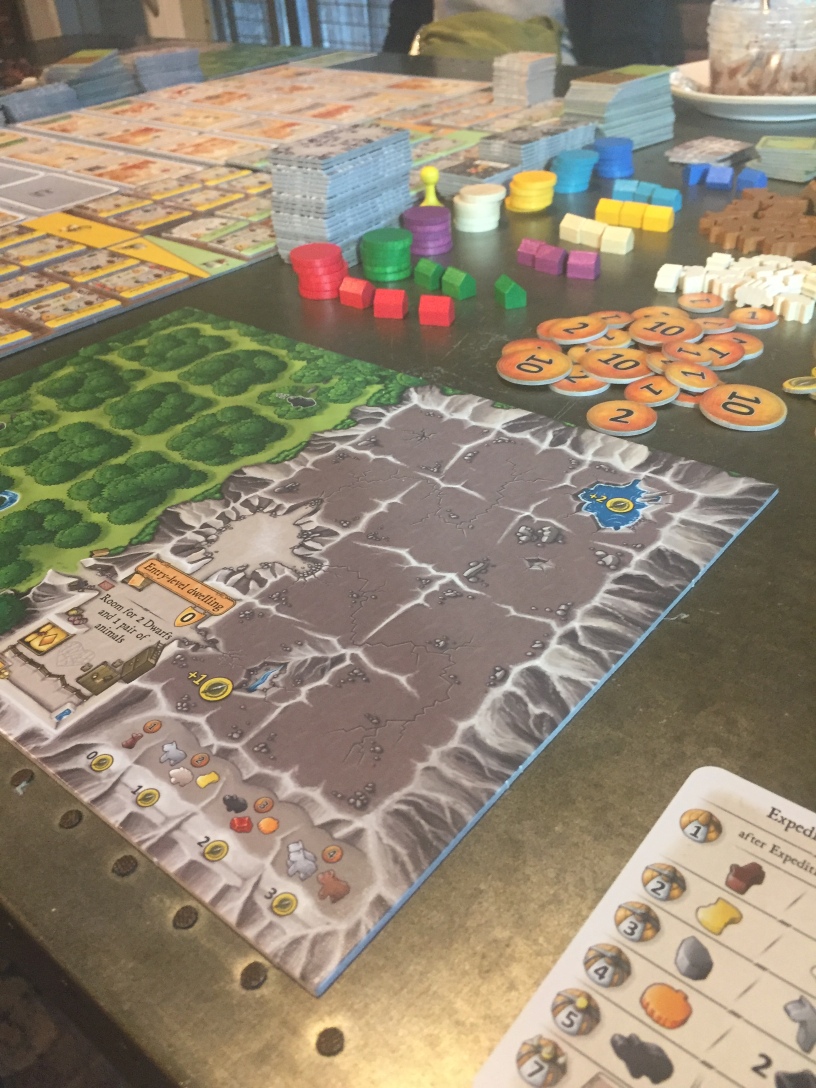Type: Worker Placement / Euro
Time to play: 30 – 45 minutes per player per game (Teaching: 20 – 25 minutes)
Best played with: 1-7 players (Best with 4)
You are a dwarf, a miner, and you have a nice home in the hill and a wife. Well, it’s time to start exploring, building up that home, and tending to the land. Only thing is, it turned out your neighbour had the same idea! Caverna is a tight worker placement where between 1 and 7 players try to develop their hovel and then collect points for… well for everything.
This is another game in the Uwe Rosenberg series of worker placements. Games that reward you for the diversification of developments that you can achieve in a short number of turns. In Caverna, these diverse ranges include farming, building rooms and family. These games also have a function of allowing you to build your own win conditions -bonus points or multipliers for different conditions. You choose and build these through the game so that you can be ready for the end game scoring,
These games also have a common strategy for growing your family (your number of workers) and for feeding them. You grow them by taking the relevant action (and it’s limited) and you feed them at the end of specific rounds. However this is where Caverna starts to diverge – those harvest rounds are not fixed, and that keeps you guessing as to when you need to feed your people!
That’s a big challenge then – keeping people fed. It’s also a challenge to fill up your board, and ultimately you need to to earn the points. That’s because blank spaces cause negative points and because they represent the opportunity cost for an efficient play of the game. You should be able to fill that board (or avoid the negative points) and if not then you will certainly be trying to next time!
The third challenge then is to actually do all of the above in such an efficient manner that you can get more points than your opponents – enough points to win the game. However, you can do this from many paths – from farming livestock, from mining or perhaps from explorations. Even within these strategies there are variations.
It’s in these strategies though that one core mechanic becomes apparent and this you either love or hate – normally the player who goes down the path others do not, will be the winner. What that means is that there are a series of good strategies, but the best is the one that the other players don’t choose to follow. Even the best theoretical strategy is worth nothing if you get crowded out!
I find this slightly difficult in large player counts, when it feels like inevitably there will be a second player following your strategy, how good that second player is has a big impact on your likelihood of winning the game. However, it does mean the game is exceptionally well balanced and these small player driven issues matter.
Balance – ah now there is an excellent aspect of Caverna. Caverna is balanced more carefully than a pyramid of hippos! It has different boards for different player counts – these vary actions (both type and number) and create a similar game experience at every player count.
The other strong aspects of Caverna, including that the strategies don’t necessarily rely on extra workers (family growth). There are strategies that allow you to go for only a small number of workers or indeed workers who cannot explore. These strategies can often be good because other players tend to avoid them!
I would also pick out the variety of rooms as another great factor of Caverna – ok, it takes longer to set up, but it does make for a lot of options and interesting ways to play the game. The last thing I would pick out is the avoidance of luck! The lack of card drafting, dice and random draws, means that this is a game about picking actions and building the farm. You choose every step and there is nothing that can stop you – except other players and perhaps poor planning!
Last notes;
- If you like to avoid luck, and feel like the clock is always against you… have a go at this classic.
- If you enjoy the tightness of Agricola, this game is a bit more forgiving and losses some of that tension
- If you win – try another strategy!
